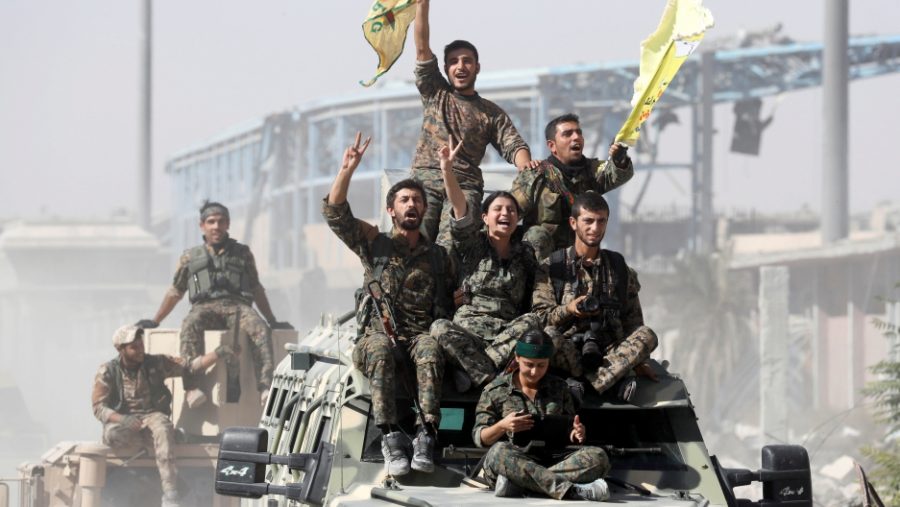Is this the end of ISIS?
Syrian forces celebrate the liberation of Raqqa from ISIS control. Credit: Erik De Castro/Reuters, published on October 17, 2017, link to original https://media.pri.org/s3fs-public/styles/story_main/public/story/images/RTS1GUES.jpg?itok=w-7gAkg1
Under the Trump administration, America has seen major improvements in the fight against ISIS. In Trump’s first 11 months as president, ISIS lost 18 percent more of its territory compared to the amount lost in the previous 28 months under the Obama administration. The Trump administration also accounts for the 68 percent of civilians liberated in the past four years. While many may argue this is just a carry over from the Obama administration, U.S. commanders and White House employees have given Trump and Defense Secretary General Mattis credit. White House special envoy Brett McGurk, who also served in the Obama administration, agrees that Trump’s adjustments accelerated the pace of defeat. In August he said, “These delegations of tactical authorities from the president has really made a difference on the ground.” Most of the adjustments the administration made came in amendments to the rules of engagement overseen by General Mattis. The new rules granted more leeway to top generals in the region allowing for them to conduct missions more quickly. Mattis also implemented the removal of proximity requirements on multiple terrorist organizations and the spread of U.S. advisers to smaller allied units.
The ultimate game changer in the more than three year war came when ISIS was defeated in its self proclaimed capital in the northern Iraqi city of Mosul. The western part of the city was taken over which boosted the moral of Iraqi soldiers and crippled the will of ISIS. After the liberation of Mosul, many other cities like Tal Afar, Hawija, and Al Qaim fell out of ISIS control. Colonel Ryan Dillon, the chief U.S. spokesman for the U.S. led coalition, commented on the victories saying, “ It just snowballed, and it turned into where we are right now, with a full liberation of Iraq, and in Syria, continuing to chase down ISIS elements, the remnants of ISIS elements, in Syria.” While the coalition is defeating ISIS on the ground at a rapid rate, the defeat of the terror group is far from over. Secretary of Defense General Mattis said during a December press conference, “I think there’s still problems, the fight is not over with them, don’t believe it when somebody says that ISIS is completely down. We’re continuing to fight them, they’re on the run, they can’t hold against our alliance at all.”
There is much speculation on where ISIS will retreat to as their time in Iraq and Syria is running out. In a propaganda film released this month by ISIS, they called for Muslims world wide to immigrate to Afghanistan in order to expand their foothold. This is a growing concern for the United States as there is already a fight taking place against the Taliban within Afghanistan. As a result, the Trump administration has now made recent military operations against ISIS in Afghanistan a top priority.
Your donation will help support The Lambert Post, Lambert High Schools student-run newspaper! Your contribution will allow us to purchase equipment and cover website hosting costs.









J. Cavanaugh • Mar 23, 2018 at 2:43 pm
This article will have a positive impact on those who read it and foster a belief that the United States now is showing such strength against an evil power and winning. That is not to mean that we ever relax but President Trump knows that allowing General Mattis ultimate control is the correct agenda. Thank you!